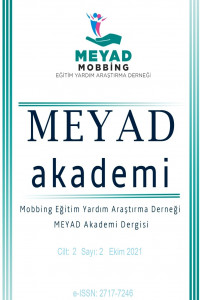Öz
Günümüzde dijitalleşme adı verilen bilgi ve iletişim tabanlı süreçler, iş ve özel yaşamdan toplumsal ilişkilere, psikolojiden sosyolojiye, yaşam tarzından çalışma şekillerine kadar çok geniş bir alanda etkili olmaktadır. Nihai yararlanıcılar açısından pek çok avantajına karşın iş görenler aşısından dijitalleşmenin yarattığı bazı sorunlar vardır. Aşırı yüklenme, sürekli bağlantılı olma, iş yapış şekillerinin değişmesi, karmaşıklık, işte sözde varolma (presenteizm), iş-yaşam arasındaki belirsizleşme gibi ortaya çıkan pek çok sorun dijital stres adı verilen duruma yol açmaktadır. Dijital stresin temelinde çalışma yaşamında dijitalleşmenin zaman ve mekân esnekliğini artırması, mobil teknolojilerdeki gelişmelere bağlı olarak iş temposunu hızlandırması, sürekli çevrimiçi bağlılığı yol açması ve daha fazla çoklu görev ortaya çıkarmasıdır. Tüm bunlar bir araya geldiğinde iş yaşamında dijital stres söz konusu olmaktadır. Bu çalışmada görece yeni bir çalışma olan dijital stres kavramının anlamı, içeriği ve boyutları hakkında açıklamalar yapılmıştır. Çalışma sonucunda işgörenlerin ihmal edildiği bir dijitalleşmesi sürecinin stres oluşturan etkilere yol açtığı tespit edilmiştir.
Kaynakça
- 1. Fischer, T., Reuter, M. and Riedl, R. The Digital Stressors Scale: Development and Validation of a New Survey Instrument to Measure Digital Stress Perceptions in the Workplace Context. Frontiers in Psychology 2021;(12), p.1-18.
- 2. Smith, A. et all. Digital Overload among College Students: Implications for Mental Health App Use. Social Sciences 2021;10 (279), p.1-15.
- 3. Steele, R.G., Hall, J.A. and Christofferson, J.L. Conceptualizing Digital Stress in Adolescents and Young Adults: Toward the Development of an Empirically Based Model. Clin Child Fam Psychol Review, 2020;(23), p.15-26.
- 4. Wimmer, J. and Waldenburger, L. Digital Stress In Everyday Life. The 21st Annual Conference of the Association of Internet Researchers Virtual Event/ 2020; 27-31 October
- 5. Gilbert, A., Baumgartner, S. E. and Reinecke, L. Situational Boundary Conditions Of Digital Stress: Goal Conflict and Autonomy Frustration Make Smartphone Use More Stressful. PsyArXiv; 2021; DOI: 10.31234 / osf. ıo / fzct9.
- 6. A Harris, B. A. and Woodlock, D. Digital Coercive Control: Insights From Two Landmark Domestic Violence Studies. The British Journal of Criminology, 2018;59(3), p.530-550.
- 7. Demirel, E. T. Mesleki Stresin İş Tatminine Etkisi: Örgütsel Desteğin Aracılık Rolü. Niğde Üniversitesi İİBF Dergisi, 2013; 6(1), s.220-241.
- 8. Akdemir, A., Girgin, S. ve Girgin, Ü. İlkokul Müdürlerinin İş Stresi Hakkındaki Görüşlerinin İncelenmesi. ULAKBİLGE, 2021; (58), s.363-382.
- 9. Hiçyılmaz, S. Örgütsel Stres Kaynakları ve Yönetimi: Türkiye ve Rusya’dan Seçili Özel Sektör Çalışanları ile Nitel Bir Çalışma. Uluslararası Beşeri Bilimler ve Eğitim Dergisi (IJHE), 2020; 6(14), s.670-707.
- 10. Wrede, S. J., Anjos, D., Kettschau, J. P. and, Claaben, K.(201). Risk Factors for Digital Stress in German Public Administrations. 2021; DOI: https://doi.org/10.21203/rs.3.rs-645937/v1, (20.09.2021).
- 11. Brod, C. (1982). Managing Technostress: Optimizing The Use Of Computer Technology. Personnel Journal 1982; 61(10), p. 753-757.
- 12. Ragu-Nathan, T. S., Tarafdar, M., Ragu-Nathan, B. S., Tu, Q. The Consequences of Technostress for End Users in Organizations: Conceptual Development and Empirical Validation. Information Systems Research 2008;19 (4), s.417-433.
- 13. OECD Preparing for the Changing Nature of Work in the Digital Era. Retrieved 20.09.2021from https://www.oecd.org/going-digital/changing-natureof-work-in-the-digital-era.pdf
- 14. Cijan, A., Jenič, L., Lamovšek, A. and Stemberger, L. How Digitalization Changes The Workplace. Dynamic Relationships Management Journal 2019; 8(1), s.3-12.
- 15. Kalischko, T. and Riedl, R. Electronic Performance Monitoring in the Digital Workplace: Conceptualization, Review of Effects and Moderators, and Future Research Opportunities. Frontiers, 2021 https://doi.org/10.3389/fpsyg.2021.633031, (20.09.2021).
- 16. Ayyagari R, Grover V, Purvis R. (2011). Technostress: Technological Antecedents and Implications. MIS Quarterly. 2011; 35(4), s.831-858
- 17. Nalçacıgil E. ve A. Özyılmaz, “İş Yaşamında Duygusal Zekâ”, İktisadi ve İdari Bilimlerde Araştırma ve Değerlendirmeler, (Ed. K. Vatansever), İçinde; 2021; s.143-169, Ankara: Gece Kitaplığı.
- 18. Cazan, A. M. The Digitization of Working Life: Challenges and Opportunities. Psihologia Resurselor Umane, 2020;(18), p.3-6
- 19. Nalçacıgil, E. The Transformer Effect of Industry 4.0 Concept On Human Resources: Hr 4.0. International Journal of Disciplines In Economics - Admınıstratıve Scıences Studıes (Ideastudies) 2020; (17), p.261-270.
- 20. Nalçacıgil, E. (2021). “Covid 19 Salgını Döneminde Uzaktan Eğitim Sürecine İlişkin Akademisyenlerin Görüşleri: Kapadokya Üniversitesi Örneği”. Uluslararası Kapadokya Salgın Dönemleri Kongresi Bildiriler Kitabı, İçinde;Kapadokya Üniversitesi, 2021; s.158-162 31 Mayıs-02 Haziran 2021, Nevşehir.
Ayrıntılar
| Birincil Dil | Türkçe |
|---|---|
| Konular | Sosyal Psikoloji |
| Bölüm | Derlemeler |
| Yazarlar | |
| Yayımlanma Tarihi | 26 Ekim 2021 |
| Gönderilme Tarihi | 30 Eylül 2021 |
| Yayımlandığı Sayı | Yıl 2021 Cilt: 2 Sayı: 2 |


